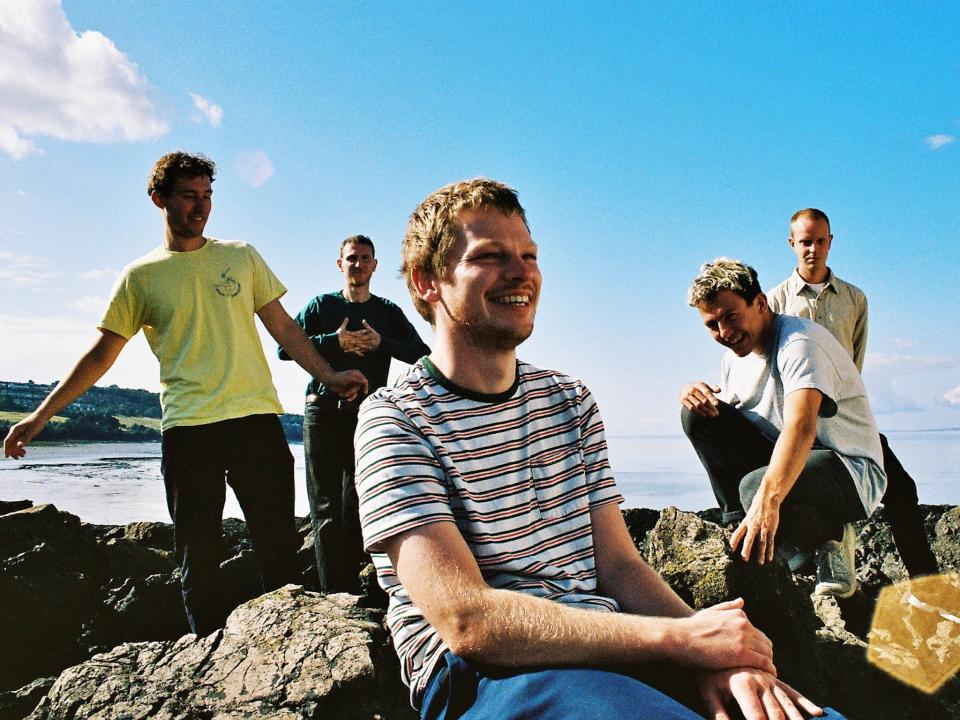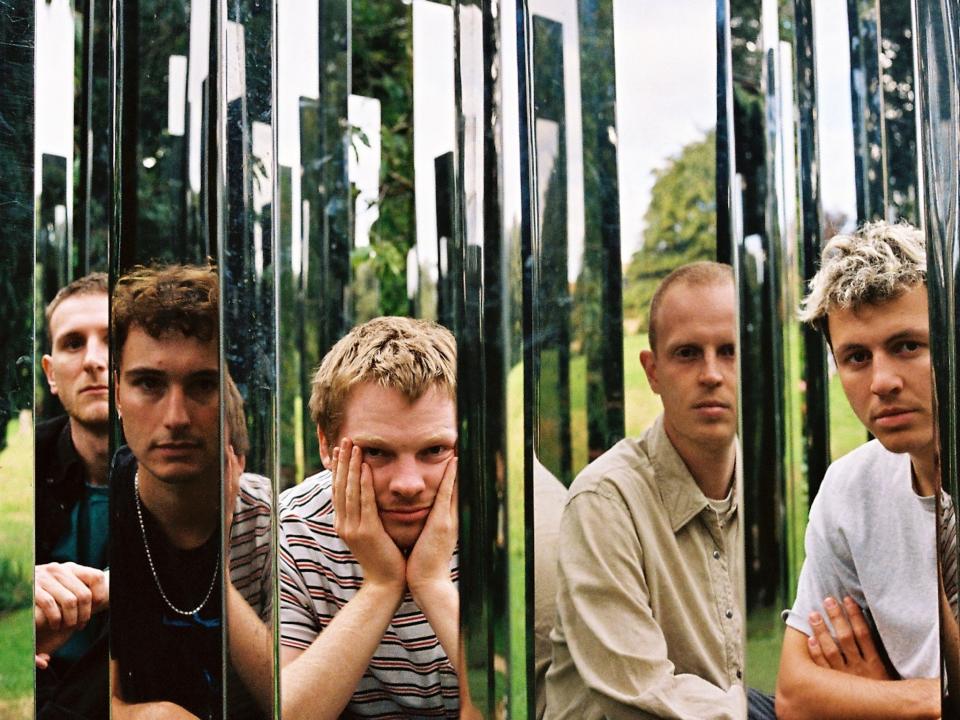Squid: ‘It’s not a rock-star life – it’s a few warm beers and some Kettle crisps’

It slapped him in the face!” Squid are explaining the thunderous end to their haywire nine-minute song “Narrator”. Keyboardist Arthur Leadbetter was bashing a big metal spring on the ceiling when it crashed to the ground, hitting him on the way down. Most people would have cut that out of the final edit. Squid left it in.
It’s typical of a debut album full of hairpin turns. Bright Green Fields swerves between shrieking instrumentals and smooth groove – each track a riposte to the many, many attempts to categorise the Brighton band with their supposed cohort: Black Midi, Porridge Radio, Idles, Shame, Sports Team.
Post-punk this. Crank-wave that. “We just want to follow ideas based on their musical merit rather than their stylistic merit,” says Anton Pearson, the band’s guitarist. “And I guess most genres are characterised retrospectively,” adds Laurie Nankivell, “so if you want to make music that sounds like the future then you can’t put it in a box.” Ollie Judge, Squid’s lead singer and drummer, chimes in. “I like post-genre.” The rest of the group laugh, aware of how pretentious that sounds. But it is true that Squid don’t really sound like anyone else. The most accurate comparison is one I came across in the comment section of an old YouTube video: “Like an angry B-52s”.
Squid – who comprise Judge, Pearson, Nankivell, Leadbetter and Louis Borlase – began in Brighton less than five years ago as not much more than a “really bad” pseudo-jazz band. Over the course of two EPs and a smattering of left-field singles, they have developed into a rare breed of genuinely exciting “ones to watch”. Since releasing their krautrock EP Lino in 2017, the band have been playlisted on BBC radio, opened for Seventies post-punk pioneers Wire, played at Glastonbury, sold out Scala, released their second EP Town Centre to critical acclaim, and most recently signed with Warp Records. Today, they’re autographing copies of their debut album Bright Green Fields, which is out on Friday. Still, the nerves are in overdrive.
“My mum called it a grower,” grimaces Judge. “I was kind of annoyed when she said that but now I think that’s a great compliment to pay an album. It definitely rewards repeat listens. Even now, I’ll notice things that Dan [Carey, the album’s producer] has put in or something one of the guys changed when I wasn’t in the room – like taking out all the vocals.” The room erupts in laughter, all 10 shoulders shaking in unison.
Before splitting themselves over the three available sofas, Squid had initially piled onto a single brown two-seater. Perching knee to knee and grinning, they looked like one of those family photos parents get taken of their kids. The five friends, now in their mid-twenties, met at Brighton university and share the kind of secret, fraternal language where one seemingly innocuous word can trigger hysterics. “It’s an inside joke,” says Nankivell when the group cackles at the mention of Pleasantville, the Reese Witherspoon comedy they watched together over lockdown.
With the pandemic halting in-person meet-ups (these days the group are spread across London, Bristol and Wiltshire), Squid were forced online, dropping .wav files into a shared inspiration folder. You wouldn’t know. Bright Green Fields is a confident debut that doubles down on the band’s reputation for producing weird music. It contains a scrap yard’s worth of noises: detuned instruments, a metal gate, a medieval instrument called a racket, voice memos of their mates talking.

Shaking off any genre label has allowed Squid to sidestep Twitter dramas and intra-scene feuds – particularly in the world of post-punk. “No one really involves us in it,” says Borlase, feigning upset at being excluded from the fray. I suggest that Squid start @-ing other bands on Twitter for some cheap publicity. Judge recalls how they used to “try and stir up beef with the Black Midi guys by playing their cover of ‘Boom Boom Boom’ whenever we did soundcheck”. Idles v Sleaford Mods; Shame v Sports Team; Squid v Black Midi? “Nah, the worst part was they never even heard it,” says Borlase with a shrug. “But it’s not really our style. Not enough mean bones.”
Considering Squid wrote a millennial anthem against late-stage capitalism (their breakout single “Houseplants” took to task London’s ludicrous rental market and obsession with leafy companions), political chat is kept to a minimum today. None of its members considers Squid to be an “explicitly political band”. Leadbetter, the group’s quietest member, chirps up: “I think we all have a shared set of core beliefs that any group of friends normally does but we don’t have one clear political vision or goal. Our music is inherently political because of who we are as individuals in our lives but we’re not a political platform.”
There are other issues their music addresses, only more quietly (I don’t mean that literally; Squid tracks are disparate but one thing they share is a certain decibel level). In “Documentary Filmmaker”, Judge stretches his shouty voice into new emotional shapes, telling the story of watching a loved one being admitted to hospital with anorexia. “There’s a stigma of what it means to be a man and talk about mental health and we’re always trying to improve on it,” offers Borlase. “As a friendship group, we’re pretty communicative about it. Maybe as a band, we’re not the best.”
As is typical for any “up-and-comers”, the delay between superficial victories and actual financial security is ongoing. Don’t assume that because they were on the cover of NME last month, they can afford a house. “Yeah, some people from secondary school will message me being like, ‘Oh my god, I saw your cover story!’” says Pearson. “And it’s just like… yeah...” says Judge. Borlase interjects, “It’s wrong to say that doesn’t mean anything though, because none of us are saying that!” A chorus of consensus fills the room. Despite their recent success, Leadbetter reveals there are still “big institutions” who want Squid to play for free. Can they name names? A loud howl of “noooo” and raucous laughter is the party line. Worth a shot.
“It’s like my mum. She thinks that I live this rock-star life and gets really excited about coming backstage when really it’s just a room with a few warm cans of beer and some Kettle crisps,” says Judge. He grins, his yellow cap pulled down low. “But that’s good. I like it like that.” Leadbetter poses the question to his fellow bandmates: if it was between playing a gig at the O2 Academy or playing The Windmill again, which would it be? “The Windmill,” says Pearson almost immediately.
The band have a soft spot for the beloved Brixton venue. They recently joined forces with Goat Girl, Fontaines DC and Fat White Family when it was at risk of closure during the pandemic. Judge is less sentimental. “The O2,” he answers, half-serious. “They’ve got loads of restaurants there and you can’t do VR Mario Kart at The Windmill. Come on guys.”
A few years ago, Squid might’ve had to protect their sound against industry bigwigs afraid of alienating audiences. But a new generation raised on Spotify’s infinite choices are proving that genre is becoming increasingly dated. The success of Squid’s experiment – sold-out shows, climbing streaming figures and glowing reviews – is self-evident. And with the chaotic but meticulously arranged Bright Green Fields, Squid have distilled Squid-ness to the most Squid-y it can be. Bring on the O2.
Squid’s debut album Bright Green Fields is out on Friday via Warp Records.
Read More
Shame: ‘We were tourists in our own adolescence’
Idles: ‘What the f*** is wrong with Sleaford Mods?’
Sports Team: ‘We recognise we’re part of a system, but you have to laugh at some of it’
‘There’s a complete fearlessness to them’: Inside the raucous new south London guitar scene
Fontaines DC interview: ‘Our album is one of the best that’s been written this century’
‘It’s the beginning of a new era’: the POC punk bands reclaiming pop-punk

 Yahoo Finance
Yahoo Finance 